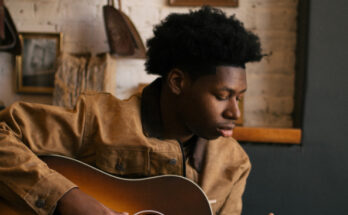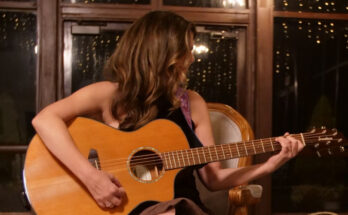Dorthia Cottrell envisions her music as both a document of love and a reconciliation with death. On her new album, Death Folk Country, Cottrell wards off death through creation – the most distilled form of love. The spirit of love passed on through her words will be the ultimate reward for earthly suffering. Cottrell’s enigmatic presence guides listeners down a path of introspection – Death Folk Country‘s massive scope touches upon tales of love, loss, and so much more.
Cottrell was raised in rural King George, Virginia, a town with less than 5,000 inhabitants. Forests and tall-grass fields stretched before her. Beauty and boredom soared. That vague melancholy and memory of the American South is smudged all over Cottrell’s music. Cottrell grew up a goth, an outcast in a small town – a time and place she revisits throughout Death Folk Country.
“This album to me is about painting a picture of a place where my heart lives,” Cottrell explains. The title Death Folk Country is partly me describing a genre that fits the sound – but it’s also meant to be taken as a Naming, a coronation of the world inside me. Death Folk Country is the music and also the land where the music takes place, and the two have always been inextricable from each other.”
The album’s lead single “Family Annihilator” directly speaks to the unease and tension of Cottrell’s surroundings. “Porch lights keep the demons at bay,” she sings over crashing cymbals and a field recording of birds. “I had never played it before, I kind of brought it out of the attic,” Cottrell says of the song. Despite being over a decade old, “Family Annihilator” spoke to the moment she was in. With the threat of another four years of conservative offices in power, Cottrell thought of family back in the South who would be voting, and remembered something her grandfather, a farmer, had told her years ago: “If a crop is diseased, you have to burn the whole crop.” “‘Family Annihilator’ is a result of me wondering if the whole field must burn today, to save the flowers of tomorrow,” Cottrell says.
Elsewhere, the sounds of Cottrell’s childhood can be heard all over the album, and no more so than on “Harvester” and “Black Canyon” – tracks decorated with chimes and monk’s bells; what Cottrell would have heard when sat out on her front porch in King George. These are sounds of nature longing. These are sounds Cottrell associates with both her upbringing and also the world of Death Folk Country.
Cottrell’s voice, a quavering alto, fills the emptiest of canyons. Singing in echoing harmony with itself, her voice is a kind of prophecy, bringing home to the present thoughts and realizations from the future, even as Cottrell buries herself in remembrance of the past.
“I grew up deep in a Virginia Pine forest in a house built entirely by my grandpa,” Cottrell recalls. “The only type of door I knew was made of plywood and had a hook instead of a knob. We were excited to have our washing machine and dryer on the porch so we didn’t have to hang clothes up to dry in the winter. Our heat came from burning wood. If you didn’t cut the wood you didn’t get warm. If you didn’t make a specific effort for something, you went without it. And I loved it. I still love it. The smell, the air, the way it looks, the way it sounds. The way it doesn’t sound. The feeling.”
Death Folk Country takes these nostalgic ideas of “home” and confronts them with their own imperfections and darkness.
“There are things I don’t love about it too. Dark things. Misguided ideas. Fear of things not understood. An altogether monstrous and violent evil that seeps unsuspecting and aloof (seemingly) into even the most (seemingly) innocent conversation. As I grow older, the things I love and hate about it only become more and more vivid and I often think about how to keep the two worlds apart–how to separate the divine from the evil and if it’s even possible.”
Death Folk Country sees its release April 21 via Relapse Records, her first for the label and follow up to her highly acclaimed, 2015 S/T solo debut. All songs on Death Folk Country were written / played by Dorthia Cottrell and recorded / produced by Jon K. and Cottrell at SANS Studios in Richmond, Virginia.


